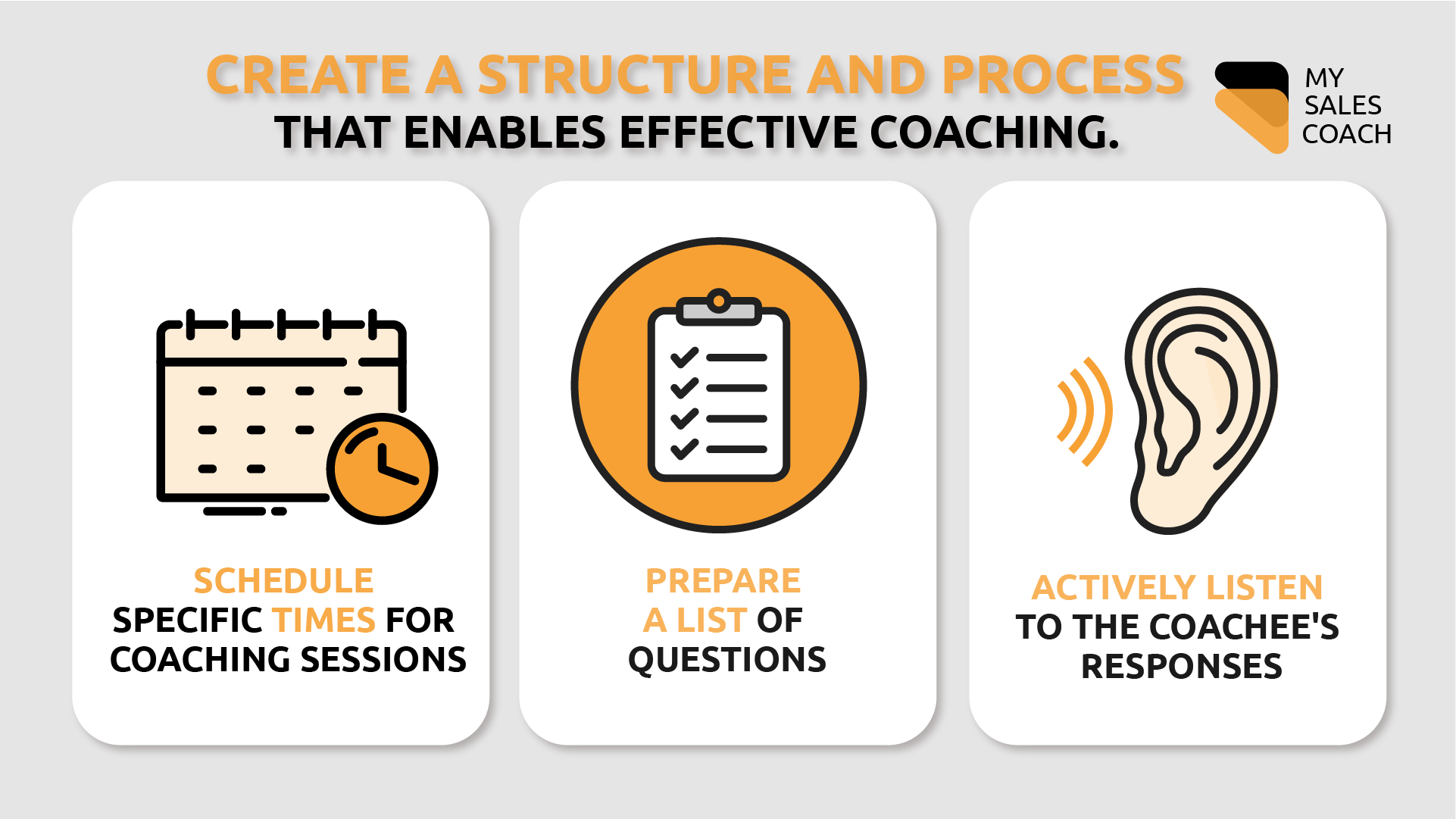Sales coaching is an essential tool for sales managers looking to improve revenue, boost personal development and create other desirable outcomes. However, coaching has many associated challenges, and sales managers may encounter obstacles, including:
- Separating managing from coaching.
- Finding the time to coach.
- Dealing with coachees who resist coaching.
- Ensuring coachees implement what they learn.
To help sales managers overcome these challenges and make the most of coaching, this blog post explores these four obstacles in detail, providing actionable advice on overcoming them. We’ll also discuss the benefits of coaching and how sales managers can create a positive coaching culture in their teams.
Four Coaching Challenges
Coaching is an essential activity for sales managers that can improve revenue, boost personal development, and produce other desirable outcomes. However, coaching is not easy, and sales managers face several challenges in their coaching journey.
One of the primary challenges of coaching is separating managing from coaching. Managers have a team number to deliver, and their top priority is to ensure they hit that number. Because of this, it is tough for them to leave their agenda as a manager at the door while coaching. Managers may prefer to tell the coachee what to do in coaching sessions because it's quicker. But coaching requires active listening and nudging in the right direction. When you impose your priorities on the coachee, you don’t guide them towards their potential.
Another challenge for sales managers is finding the time to coach consistently. Managers have to deal with unexpected action items throughout the day, including forecasting, recruitment and helping out other teams. Even with the best intentions, coaching is often something that can wait until tomorrow.
The third challenge is dealing with coachees who resist coaching. For example, coachees might tell managers what they think they want to hear rather than being honest, making the coaching session ineffective. Additionally, when there’s a personality clash between the coach and coachee, coaching cannot be effective.
Lastly, managers might find it difficult when coachees do not implement what they learned in coaching sessions.
Be Conscious About Your Coaching
Self-reflection is the key to overcoming these challenges. As a coach, you need to be honest with yourself about how you coach. Then, take time to work on:
- Separating managing from coaching
- Coaching consistently
- Handling coachees that resist your coaching
- Nudging them towards implementing what they learn
However, many companies find more success by bringing in independent coaches. External coaches bring a fresh perspective and a different level of consistency. They won’t put off coaching until tomorrow.
To illustrate the challenges of coaching, let's take an example. Imagine a sales manager tasked with improving their team's performance. While coaching sessions are essential, the manager is overwhelmed with other responsibilities, including forecasting, recruitment, and helping out other teams.
As a result, the manager is tempted to prioritise other tasks over coaching, leading to inconsistent coaching and missed growth opportunities.
To overcome this challenge, the sales manager must prioritise coaching by blocking off specific times in their calendar. This approach helps the manager stay on track and makes coaching sessions more efficient.
Additionally, the manager must set clear goals and objectives for coaching sessions, helping them stay focused on the coachee's growth.
By prioritising coaching and setting clear goals, the sales manager can overcome the challenge of finding the time to coach and make coaching consistent.
While coaching challenges can be daunting, sales managers can overcome them with self-reflection, intention and practice.
Overcoming The Challenges
To address the challenge of separating managing from coaching, create a structure and process that enables effective coaching. This structure should include:
- Scheduling specific times for coaching sessions
- Preparing a list of questions
- Actively listening to the coachee's responses

The focus of your coaching sessions should be on the coachee's growth. Make sure you encourage your coachees to share their thoughts and ideas.
To find time to coach on a consistent basis, prioritise coaching by blocking off specific times in your calendar. It helps you stay on track and makes your coaching sessions more efficient. Consistent coaching helps build trust between the manager and coachee, resulting in more productive coaching sessions.
Dealing with coachees that resist coaching can be challenging, but sales managers can overcome this challenge by building solid relationships with their coachees. Communicate with coachees to understand their goals and motivations.
Create a coaching plan that aligns with their aspirations. This approach helps coachees develop a sense of ownership and investment in their development. It also allows managers to provide targeted coaching relevant to coachees' needs.
If there’s a personality clash, coaches should be aware of whether they are imposing their personality on the situation and try to avoid that. If it's not working out for the coach or the coachee, it's important to recognise it and end the coaching relationship.
When coachees do not implement what they learn in coaching sessions, managers should remember that they cannot control the outcome. However, you should encourage the coachee to give feedback on how you can improve your coaching sessions. The best way to do this is to ask the coachees if they think the coaching sessions add value and what you can do to make them more beneficial.
Creating a Positive Coaching Culture
To make the most of coaching, sales managers should develop strong communication skills and set clear goals and objectives for coaching sessions. By building solid relationships with coachees and creating a positive coaching culture, sales managers can help their coachees reach their full potential and achieve long-term success.
With the right mindset, structure, and process, sales managers can overcome coaching challenges and help their teams perform at their best.
It’s also a good idea for sales managers to lead by example and seek coaching themselves. Managers who are open to coaching can create a positive culture of learning within their team, encouraging coachees to seek feedback and continuous improvement.
In addition, by prioritising coaching for themselves, managers can also develop new skills and perspectives that they can share with their team.
Why Organisations Hire External Coaches
Hiring external coaches is a way for sales managers to provide their coachees with independent guidance and support. While internal coaching can be effective, external coaches:
- Bring a fresh perspective to the session
- Ensure consistency (so sales managers focus on their business priorities)
- Create a safe space for coachees to share their thoughts and ideas, leading to more productive coaching sessions.
- Have the coaching conversations managers can't - reps can struggle to open up to a manager and share their vulnerabilities.
- Giving an employee access to their own personal sales coach is also an incredible perk when recruiting and retaining top talent.
- Further help organisations hold reps accountable because they're getting the coaching they need
Don’t Fear The Challenges
While these coaching challenges can seem daunting, the benefits of coaching are numerous.
- Reps who receive coaching are 33% more likely to hit quota -Keenan Sales Coaching:
- Companies with dynamic sales coaching programs achieve 28% higher win rates than those that don’t – Centre for Sales Strategies
- Half of all new sales reps who do not hit initial performance milestones have no coaching in place – The Bridge Group
These statistics demonstrate the importance of coaching and how it can significantly impact sales performance. Coaching can also lead to improved revenue, personal development, and other desirable outcomes.
Whether managers choose to work with internal or external coaches, coaching helps sales teams achieve higher win rates, hit quota, and develop new skills that lead to long-term success.
Coaching is a critical activity for sales managers looking to help their coachees reach their full potential. When you prioritise coaching, build strong relationships with coachees, seek external guidance, and set clear goals and objectives, you set yourself up for success.
By developing your communication skills and leading by example, you create a positive coaching culture that benefits both managers and coachees. Don’t fear the challenges, and accelerate your coaching today.



